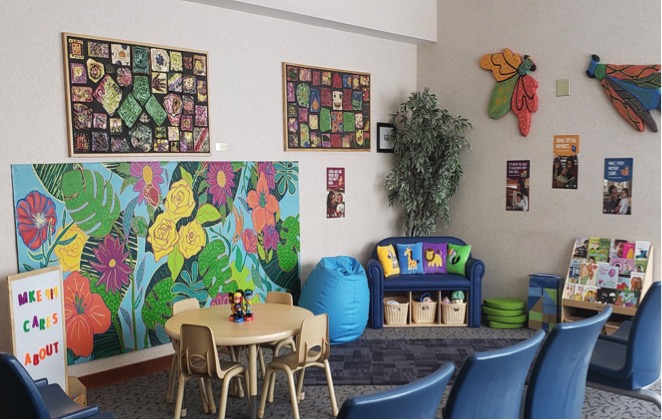The Milwaukee Journal-Sentinel has called Dea Wright the city’s “early childhood education czar.” True to someone entrusted with czarlike power, she recently banished three dudes who had been standing around doing nothing for far too long. They were literally collecting dust.

The five-foot-tall Chipmunks were “a little scary, honestly,” Wright admits.
She recalls encountering the oversized statues on her first visit to the waiting area at the Vel R. Phillips Youth and Family Justice Center. A toddler was running up and down the hallway while his guardians desperately tried to control him with snacks and toys. “It was stressful for me, just watching. Imagine what it must be for the people waiting their turn. They already have stress in their lives. If they’re here, they’re already going through trauma. Why are we making it worse?”
In trying to change the scene at family court, Wright knew exactly who to call. “I reached out to the Clinton Foundation initiative Too Small to Fail, and they said, ‘We want to work with you on this.’” The resulting Family Read, Play & Learn space is warm, welcoming and stocked with books. Unique posters designed in collaboration with Too Small To Fail hang in the space to encourage families to talk, read and sing together.

Ramona Gonzalez, Presiding Judge for La Crosse County Circuit Court, has championed the Milwaukee experiment and expressed interest in scaling it nationally. This model could gain traction during the recovery from the COVID-19 pandemic, as officials reassess public spaces.
👉 Read more: In what could be a national model, Milwaukee unveils cozy learning space in children’s courthouse
“Too Small to Fail is meeting families where they are in everyday spaces like laundromats, pediatric offices and playgrounds to provide them with the tools and resources to support early brain and language development,” said Jane Park, Director of Too Small to Fail. “The early years of children’s lives are critical in preparing them for lifelong success, and we are grateful for partners such as Dea Wright and the National Council of Juvenile and Family Court Judges that enable us to continue expanding “Family Read, Play & Learn” spaces into courts across the country.”
“Family Read, Play & Learn” spaces were first launched in laundromats as part of the partnership between Too Small to Fail and the LaundryCares Foundation. Evaluation findings showed that children were observed engaging in 30 times more literacy activities compared to the laundromats that did not have these areas.
👉 Read more: “Meeting (and Teaching) Families in Unexpected Places Can Transform Cities”
Wright believes all children should have equitable access to evidence-informed programs and services. The Milwaukee Cares project, which is part of Office of Early Childhood Initiatives, is devoted to bringing language and literacy-rich environments to places like this where the need is greatest. (As of this writing, the Children’s Court Center in Milwaukee is open for just two hours per day, owing to COVID-19 precautions.)
People coming to family court have more than their share of challenges, including mental health, alcohol and other drug abuse, domestic violence and incarceration. They often have trouble accessing services, education, housing and employment. Please note that in times of crisis, calls to Child Abuse Hotlines can skyrocket. Specifically during like the COVID-19 pandemic when families live closely in quarantine, calls to the hotlines have risen by 20 percent over this time last year. View the CBS News segment.
Types of cases seen in family court:
- Children in Need of Protection and Services
- Delinquency cases
- Adoptions
- Guardianships
- Injunctions
- Termination of Parental Rights
- Healthy Infant Court
- Family Drug Treatment
- Unified Court
Learning is happening right now, in the moment, Wright says. How do we influence the learning that we know is occurring? Parents are the child’s first teacher and are equipped to be responsive. Language and literacy materials shouldn’t be hard to come by. Colorful, cozy, arm decor doesn’t have to be expensive. These spaces are reminders to talk, read and sing.
She continues, “We know that if children are read to just 15 minutes a day, it can have a huge impact. Community spaces like this can create those 15 minutes.”
Wright, who describes herself as “someone who cares and someone who can connect,” was born in Danville, IL, and moved around a lot with her family as a child, attending nine different schools. In January, she was named a Presidential Leadership Scholar. Her pro tip for building spaces that people actually use: Listen to what they have to say. “I want to be doing this work with people,” she says. “Not for them.
Reflecting on the way traumatic events (also known as adverse childhood experiences, or ACEs) persist in the lives of the young people who endure them, Wright says, “Our job is to create memorable moments so that, next week or many years down the line, they can mentally go back to that place and feel good.”
Read more
- Article: Meeting (and Teaching) Families in Unexpected Places Can Transform Cities
- Article: Mobilizing Communities So All Children Can Make the Grade
- Article: 5 Questions for Milwaukee Mayor Tom Barrett
- Article: Transforming Parent-Child Connections in Incarceration
- ELN Studio Video: When Did Play Become a Four-Letter Word? With Roberta Michnick and Kathy Hirsh-Pasek

Mark Swartz
Mark Swartz writes about efforts to improve early care and education as well as developments in the U.S. care economy. He lives in Maryland.



